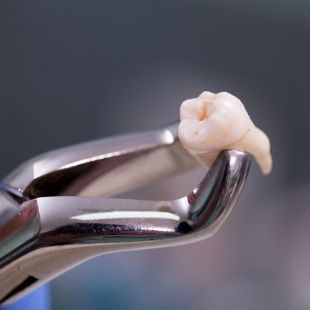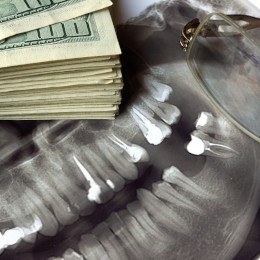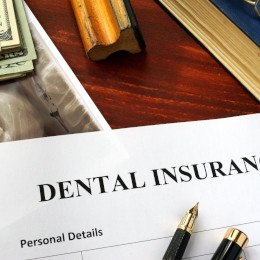Tooth Extractions – Nepean, ON
Removing Troubled Teeth to Protect Oral Health

Fisher Dental always strives to prevent tooth loss, as we consider your teeth crucial for oral and overall health. Unfortunately, there are times when a tooth simply can’t be salvaged, saved, or rescued. Dr. Bal will suggest removal work in those cases to prevent harm to your oral health. You can learn more about tooth extractions at our Nepean office by checking out the details below, but please feel free to contact our office to schedule a consultation or if you have any more questions.
Why Choose Fisher Dental for Tooth Extractions?
- Dental Implant Placement Done In-House
- Multiple Sedation Options for Comfort
- Patient Comfort is a Core Priority
Reasons Why Tooth Extractions Are Necessary

Our office only does tooth extractions as a last resort to keep your oral health from suffering major damage. These procedures may be necessary for severe issues such as:
- Severe tooth decay that may spread to nearby teeth
- Baby teeth that haven’t fallen out as needed
- To resolve dental crowding
- Major facial trauma damaging a tooth beyond repair
- The tooth being impacted, meaning that it has failed to emerge properly and is more vulnerable to infection
- Teeth must be removed to make room for dentures or orthodontic treatments.
Tooth extraction may be the only way to prevent many other oral health problems down the road such as dental infections spreading to healthy teeth.
The Process of Removing a Tooth

Dr. Bal will administer an appropriate anesthetic treatment before performing a tooth extraction to render the process completely painless, and you may also receive sedation treatment if you need extra help sitting comfortably. He will then use a tool called an elevator to lift the tooth out of its socket before grasping it with a forceps and gently rocking it back and forth to free it from the surrounding tissue. Dentists generally recommend replacing lost teeth as soon as possible to prevent bone loss in the jaw and the neighboring teeth from shifting out of alignment, so Dr. Bal will discuss your restoration options with you during your consultation.
Tooth Extraction Aftercare

After a tooth is removed, it’s important to keep the site clean to prevent infections and avoid straining the healing tissues to keep the healing process going smoothly. Your dentist will provide you with aftercare instructions that will probably include directions like:
- Take medications as prescribed
- Rinse the mouth with a solution of 8 ounces of warm water and a half teaspoon of salt to help keep the site clean
- Abstain from smoking
- Refrain from drinking through a straw
- Avoid intense exercise
- Keep the head elevated above the heart when lying down to prevent discomfort
- Get plenty of rest
Replacing lost teeth can lead to a range of wonderful health benefits such as preserving the health of the jawbone, keeping the remaining teeth from drifting out of alignment, protecting the gums from injury, and giving you the confidence to continue proudly showing off your beautiful smile.
Understanding the Cost of Tooth Extractions

The care you receive from us will be specifically tailored to your needs. While that increases the overall quality of dentistry that we’re able to provide, the variable nature of the treatment means that it’s also difficult to say exactly what care will cost before we meet you in person.
Once you’ve met us and we have a sense of your situation, we’ll be able to give you a complete estimate for what your dental care is going to cost you. Until then however, here’s what you should know about the general price of a tooth extraction.
Factors That Can Affect Tooth Extraction Cost

The cost of a tooth extraction can vary based on multiple factors, and a comprehensive evaluation is needed before providing an accurate estimate. One key factor is the type and location of the tooth, as well as the number of teeth requiring extraction. For instance, removing a single tooth will differ in complexity and cost from extracting multiple teeth.
The difficulty of the procedure also plays a major role. Simple extractions are typically more straightforward, while impacted teeth may require more complex surgical procedures, potentially involving a specialist. Additionally, the next steps after the extraction influence the overall cost. If a tooth replacement, such as a dental implant or bridge, is required, this will add to the overall treatment plan. Each case is unique, and a personalized approach is essential for determining the final cost of extraction.
Does Dental Insurance Cover Tooth Extractions?

Dental insurance often covers tooth extractions, but the extent of coverage depends on the individual policy and the type of extraction needed. Simple extractions are usually covered under most basic dental plans, while more complex extractions, such as impacted teeth or those requiring surgical procedures, may be classified as major services. Coverage for these may require additional out-of-pocket costs or be covered at a lower percentage. Some plans also include provisions for follow-up care or replacement options, like implants or bridges, but it's essential to check specific policy details to confirm.
Other Options for Making Tooth Extractions Affordable

We’re also well aware that not all of our patients have insurance. However, we still want you to be able to get the care you need, when you need it. For that reason, we offer alternatives that can potentially make the services you receive from us more affordable.
For one, we’re currently offering a $75 special on emergency exams and x-rays, which can potentially make it easier to determine whether a tooth extraction is necessary for you. We also work with financing firms that can allow you to split up the cost of your tooth extraction across several monthly payments.
If you have any questions about what you can do to make treatment more affordable, please don’t hesitate to reach out to us today!
Tooth Extraction FAQs
Can I leave the space empty after a tooth extraction?
When having a tooth removed for any reason (other than wisdom tooth extraction), it is highly recommended that you have it replaced within a timely manner. The reason is that tooth loss can result in more serious oral health problems, including loose teeth and bone loss as well as problems eating and speaking. You may find that you develop poor digestion and nutrition as well as a lisp because of your incomplete smile.
Without tooth roots stimulating the jawbone, you might also experience facial sagging over time. However, our team will discuss the various options with you during your consultation so that you can move forward with treatment and regain a complete, beautiful smile.
How long after a tooth extraction can I get dentures?
The average timeframe for denture creation and placement is 6-8 weeks. After you are fully healed from your extraction, we will take impressions of your mouth and measurements of your jaw so that they can be used to craft your new teeth.
While waiting for your dentures to be created, you will wear a set of temporary prosthetics so that your mouth can become accustomed to the foreign object. Once they are ready, your dentures will be returned to our office, and you will come in for a final fitting and receive any necessary adjustments. We will explain how to properly care for your new teeth so that they remain healthy and last longer.
What should I do after my tooth extraction?
Once you have a tooth removed, it’s important that you follow the aftercare guidelines provided by our dental team. This will ensure that your mouth fully heals. For the first 24 hours, you should avoid any kind of strenuous activity or smoking.
You’ll need to make sure that you drink plenty of water and use clean gauze to encourage a blood clot to form. To avoid the potential of a dry socket, make sure you do not spit or sip through a straw. Also, don’t touch your extraction site or eat hard, crunchy foods. Instead, opt for softer snacks like applesauce or yogurt.
You can use a cold compress to reduce any swelling and relieve discomfort as well as take an over-the-counter pain reliever as instructed.
Is there an alternative to a tooth extraction?
It will also be our goal to save your natural tooth. While the various tooth replacement options we provide, like dental implants, are lifelike, they cannot fully replicate the durability and function of natural teeth.
If we find that your tooth can be saved with a dental crown or root canal treatment, we will always suggest it first. However, if you have extensive decay, facial trauma, or advanced gum disease that cannot be treated with restorative services, the only possible solution is tooth extraction.
You can trust that our dental team will make every effort to ensure your safety and comfort throughout the procedure as well as provide helpful aftercare instructions so that you heal swiftly.
